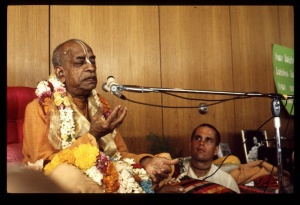FR/BG 2.11

TEXT 11
- śrī-bhagavān uvāca
- aśocyān anvaśocas tvaṁ
- prajñā-vādāṁś ca bhāṣase
- gatāsūn agatāsūṁś ca
- nānuśocanti paṇḍitāḥ
Synonyms
śrī-bhagavān uvāca: Dieu, la Personne Suprême, dit; aśocyān: ne justifiant pas l’affliction; anvaśocaḥ: tu t’affliges; tvam: toi; prajñā-vādān: des paroles instruites; ca: aussi; bhāṣase: prononçant; gata: perdue; asūn: la vie; agata: non perdue; asūn: la vie; ca: aussi; na: jamais; anuśocanti: ne pleurent; paṇḍitāḥ: les sages.
Translation
Dieu, la Personne Suprême, dit: Bien que tu tiennes de savants discours, tu t’affliges pour ce qui n’en vaut pas la peine. Les sages ne pleurent ni les vivants ni les morts.
Purport
The Lord at once took the position of the teacher and chastised the student, calling him, indirectly, a fool. The Lord said, “You are talking like a learned man, but you do not know that one who is learned – one who knows what is body and what is soul – does not lament for any stage of the body, neither in the living nor in the dead condition.” As explained in later chapters, it will be clear that knowledge means to know matter and spirit and the controller of both. Arjuna argued that religious principles should be given more importance than politics or sociology, but he did not know that knowledge of matter, soul and the Supreme is even more important than religious formularies. And because he was lacking in that knowledge, he should not have posed himself as a very learned man. As he did not happen to be a very learned man, he was consequently lamenting for something which was unworthy of lamentation. The body is born and is destined to be vanquished today or tomorrow; therefore the body is not as important as the soul. One who knows this is actually learned, and for him there is no cause for lamentation, regardless of the condition of the material body.